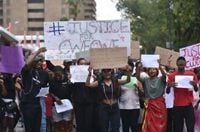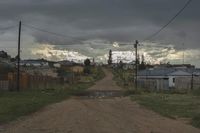In South Africa, the case of a seven-year-old girl, referred to as Cwecwe, has ignited a firestorm of outrage and demands for justice following allegations of sexual abuse. The incident, which reportedly occurred at her school in the Eastern Cape on October 14, 2024, has drawn attention to the country’s troubling rates of sexual violence, particularly against children. Police Minister Senzo Mchunu has stated that a "thorough investigation" is now "fully under way" into the allegations, which have sparked nationwide protests.
The case was initially reported to the police on October 16, 2024, but a month later, prosecutors declined to proceed, citing insufficient evidence. Minister Mchunu, in a briefing, acknowledged the numerous challenges faced by investigators, including the fact that the case had been handled by three different officers, resulting in a poorly prepared file. "One critical aspect which has continued to present a serious challenge is the matter around DNA. DNA testing was done on the victim as per procedure and the outcome was that no foreign DNA had been found," Mchunu explained.
Despite the lack of evidence, three people of interest have been identified, and further DNA testing is reportedly underway. However, the police emphasized that these individuals are not suspects at this time. Mchunu assured the public that senior officials have been assigned to the case, stating, "I can assure you that we are consulting with all relevant role players to ensure that every aspect of this matter is examined carefully and comprehensively." Yet, details surrounding the case remain scarce due to its sensitive nature.
The mother of Cwecwe, who has bravely shared her daughter's story across various platforms, expressed her frustration with both the police and the school’s handling of the matter. In a recent interview, she recounted the harrowing signs that led her to suspect something was wrong with her daughter. Initially, she noticed Cwecwe’s unzipped school trousers and her complaints of stomach pain and difficulty walking. Eventually, blood stains were found on the tracksuit she wore the day of the incident.
In her account, Cwecwe revealed to her father that while waiting for their school transport, the school’s caretaker instructed her and her classmates to sweep a classroom. She later recalled a disturbing memory of smelling a "burning tyre" during the incident. The mother’s anger was further fueled by the principal’s threats of legal action against her after she spoke out.
Adding to the controversy, AfriForum, an Afrikaner lobby group, has stepped in to represent the school’s principal, Jaco Pieterse, who has been linked to the case despite not being named as a suspect. Recently, Minister Mchunu claimed that Pieterse had submitted a DNA sample, but this assertion has been disputed. Reports indicate that the station commander confirmed no DNA was ever taken from the principal, raising questions about the integrity of the police's statements.
As the investigation unfolds, the case has attracted criticism from various quarters. Shaheda Omar, director of the Teddy Bear Foundation, which supports child abuse victims, condemned the delays and inadequate responses from authorities, stating, "The justice system is failing our children and we have to address these gaps and challenges in the structures that are failing our children."
Adding to the public outcry, controversial podcaster Penuel Mlotshwa faced backlash for questioning Cwecwe's credibility in a now-deleted post. He stated, "I don’t see this case going any further, to be honest. The credibility of a seven-year-old is also questionable, even if she pointed out the perpetrator. At this point, we can’t even confirm if she was really raped or not. It’s tough." His comments ignited a wave of anger on social media, with many South Africans condemning his insensitivity towards the young victim.
The situation in Matatiele, the town where Cwecwe lives, reflects a broader societal issue, as sexual violence is often described as "a part of life" in this region. This grim reality underscores the urgent need for systemic change in how such cases are handled by law enforcement and the judicial system.
As protests continue and calls for justice grow louder, many are left wondering what will become of Cwecwe’s case. The public’s patience is wearing thin, and the demand for accountability from both the police and the school is intensifying. With a history of sexual violence against children in South Africa, the stakes are high, and the community is united in its quest for justice.
In the coming weeks, the police's handling of this case will be closely scrutinized, as the nation awaits answers. Will the authorities finally take decisive action to protect the victims and hold perpetrators accountable? Only time will tell, but for now, the cries for justice for Cwecwe resonate across the nation.







